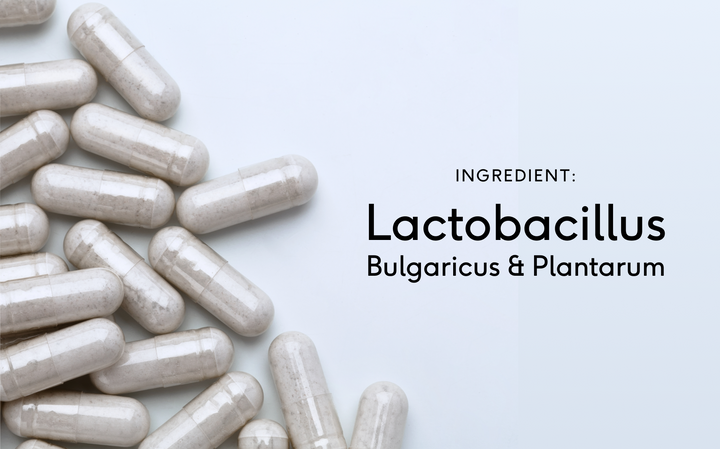Learn About Vitamin A in 5 Minutes
Table of contents

What is vitamin A?
Vitamin A, also known as retinol, is an essential nutrient, and we include a natural form of this vitamin, called retinyl acetate. This nutrient is one of the most well-known antioxidants, and it has various skin benefits while also boosting your immune system and reducing oxidative stress throughout your body.
- Powerful antioxidant that protects your tissues from free radicals
- Has amazing skin benefits that turn back the clock and erase wrinkles
- Boosts your immune system to prevent illness
- Keeps your reproductive system healthy and supports healthy fetal development
Why we love vitamin A
Vitamin A, also known as retinol, is an essential nutrient that puts an end to the dangerous rampage of free radicals in your body. As an antioxidant, vitamin A fights back against oxidative stress and inflammation, and it has several profound benefits that make it a super powered addition to Feel.
Research suggests that vitamin A may improve reproductive health in both men and women. This nutrient’s antioxidant effects boost your immune system and keep you from getting sick, and retinol also makes your skin healthier. The anti-aging effects of vitamin A make it one of the world’s most popular skin care ingredients, but you can also experience these youth-inducing benefits by taking retinol orally.
Unbelievable benefits of vitamin A
The research is clear: Vitamin A makes you healthier in a variety of distinct ways. Here are the details:
Antioxidant Benefits
As an antioxidant, you can’t beat vitamin A. This vitamin contains substances called carotenoids, and carotenoids are one of your body’s best defences against the oxidation that free radicals cause.
Since scientists have linked oxidative stress to potentially fatal conditions like heart disease, neurodegenerative diseases, and diabetes. Research indicates that carotenoids may boost your cardiovascular health.
Skin Benefits
The link between vitamin A and improved skin health is compelling. In particular, this nutrient appears to be incredibly effective at reducing wrinkles. Researchers have used topical vitamin A application to perform most of these studies, but oral supplementation also improves retinol content in your skin.
Vitamin A deficiency may increase your risk of acne, and researchers have developed several vitamin A-based drugs to treat acne topically. While these medications have serious side effects, taking your recommended daily dose of vitamin A can protect you against acne without the risks.
We've included 500μg of Vitamin A in Feel Skin Care, essential for looking your best for the inside out.
Reproductive Benefits
Retinol deficiency can reduce reproductive health in both males and females. In males, vitamin A deficiency reduces sperm counts, and in females, egg quality and egg implantation are negatively affected by retinol deficiency.
When you’re pregnant, you need the right amount of vitamin A to help your baby’s skin, heart, skeleton, and other organs grow properly. Since consuming too much vitamin A during pregnancy can be harmful, however, we only include the exact dose you need in Feel.
Immune Benefits
Vitamin A helps maintain the mucous barriers that keep your organ systems healthy and disease-free. This vitamin also helps you develop white blood cells, which are your immune system’s first line of defence against infections. Therefore, supplementing with vitamin A keeps you from getting sick.
Vitamin A provides support for a wide range of physiological functions within your body, which is why we've included 1000μg of Vitamin A in Feel Multivitamin.
Is vitamin A water-soluble or fat-soluble?
Vitamin A is fat-soluble, which means it takes a while for your body to process this nutrient. Additionally, retinol stays in your body for a significant period of time, and it builds up in your tissues.
Where can vitamin A be found naturally? Common sources of vitamin A:
Vitamin A is plentiful in fish and liver oils. This nutrient is also present in milk and eggs, and plant-based sources of vitamin A include sweet potato, spinach, carrots, and cantaloupe.
5 foods/drinks containing vitamin A
1. Sweet potato ~500% DV per 1 medium-sized sweet potato or 115g
2. Beef liver 444% DV per 85g
3. Spinach 229% DV per ½ cup or 64g
4. Carrot 184% DV per ½ cup or 64g
5. Cantaloupe 54% DV per ½ cup or 64g
What is the recommended daily intake for vitamin A?
The National Institutes of Health (NIH) has set the recommended daily intake (RDA) for vitamin A at 900mcg for adult males and 750mcg for adult females. Adult women should consume 770mcg of vitamin A every day when pregnant and 1300mcg during lactation.
What to consume to get a full daily dose of vitamin A?
Sweet potato - approximately 50g or ¼ of 1 sweet potato
Beef liver - approximately 19g
Spinach - approximately ¼ cup or 32g
Carrots - Approximately ¼ cup or 32g
Cantaloupe - approximately 1 cup or 128g
Can you absorb enough of vitamin A from food?
Vitamin A is relatively plentiful in various types of food, and it is, therefore, one of the easiest essential nutrients to source from the food you eat. This nutrient is available in both animal and plant-based foods, but if you’re unable to maintain a healthy diet every day, it might be easier to make sure you get your recommended daily vitamin A intake by taking a multivitamin.
Why is vitamin A necessary for your body?
In addition to its antioxidant functions, vitamin A is also essential to immune function, reproduction, and cellular communication. Importantly, vitamin A is a critical component of rhodopsin, which is a protein that your body uses to absorb the light that strikes your retinas. Your body also needs vitamin A to form and maintain a variety of organ structures.
Functions of vitamin A
Vision functions: Vitamin A can improve your vision, and without adequate levels of this nutrient, the ability of your eyes to pick up light is diminished.
Organ tissue functions: Your body needs vitamin A to build and maintain your kidneys, heart, lungs, liver, and other organs.
Immune functions: This nutrient helps your body regenerate mucosal barriers, which are harmed by infections and other immune disturbances.
Reproductive benefits: Vitamin A is necessary for proper reproductive health in both men and women. This nutrient is also involved in the formation of fetal tissue.
Symptoms of vitamin A deficiency
Vision Issues
Since vitamin A is essential for the production of the protein that allows your eyes to process light, deficiency in this vitamin can result in a reduction in night vision and an overall loss in vision clarity.
Immune Problems
Deficiency in vitamin A can compromise the effectiveness of your immune system, which leads to an increased likelihood of developing throat and chest infections. Vitamin A deficiency can also slow down wound healing and prolong bruising.
Infections and Acne
Vitamin A is one of the most common treatments for acne, and impaired vitamin A levels make you more at risk of developing this condition. Vitamin A deficiency also increases your risk of developing other kinds of infections and immune issues.
How long do you need to take vitamin A to start experiencing its benefits?
Since vitamin A is fat-soluble, it can take a long time for levels of this vitamin to build up in your body. However, it may be possible to notice benefits almost immediately after you start supplementing with this vitamin.
Consistency is key and our research recommends taking your Feel supplements for at least 3 months to allow your body to adjust and provide the desired benefits.
How long does it take for your body to digest/absorb vitamin A?
According to scientific research, the absorption rate of vitamin A is between 75% and 100%. Therefore, your body absorbs almost all the vitamin A you consume even though this absorption process can take a long time.
How long does vitamin A stay in your body after you take it?
As a fat-soluble vitamin, the vitamin A you consume can stay in your body for weeks, months, or even years.
Is vitamin A an antioxidant?
Yes, vitamin A is one of the most potent and prevalent antioxidants. It is commonly listed with vitamin C as one of the most important antioxidant compounds.
Can you overdose on vitamin A? What are the effects?
Hypervitaminosis A is the medical term for vitamin A overdose, and this condition occurs when you consume a large amount of retinol over a short period of time. Symptoms of mild vitamin A overdose include nausea, vomiting, abdominal pain, and brain pressure.
If you consume too much retinol habitually, however, you can damage your organs, develop osteoporosis, and suffer from elevated levels of calcium in your body. Avoid short-term and long-term vitamin A overdose effects by getting your exact RDA of this essential nutrient in Feel.
Does vitamin A dissolve, flush out, or build up in the body?
Vitamin A flushes out of your body eventually, but before it does, it builds up in your liver.
Can you take vitamin A during a diet?
It’s safe to consume vitamin A no matter what type of diet you might be observing.
Are there synthetic forms of vitamin A?
Synthetic forms of vitamin A are called “retinoids,” and they are generally used for topical applications. Oral retinoids, however, are much more toxic than natural vitamin A.
Why might synthetic forms of vitamin A be better?
There are no known benefits of including synthetic retinoids in dietary supplements instead of natural vitamin A.
Absorption rate of synthetic vitamin A
It’s reasonable to assume that substituting synthetic retinoids for natural vitamin A would result in greatly decreased absorption rates.
Why might natural forms of vitamin A be better?
Natural vitamin A is well-tolerated by the body, and this substance has a high absorption rate.
How to take vitamin A
You can either get the vitamin A your body needs through food or with a daily supplement.
Vitamin A trends in medicine
In 2019, scientists took a look at the ability of topical vitamin A as compared to bakuchiol, a recently-discovered natural substance, to reduce photoaging in skin, which is skin damage caused by sunlight. In this study, researchers found that both vitamin A and bakuchiol were useful for this purpose, but since bakuchiol doesn’t replace the functions of retinol when ingested orally, vitamin A supplements aren’t going anywhere any time soon.
Why everyone should be taking WeAreFeel supplements
While the organ and genetic damage caused by synthetic retinoids like isotretinoin has given vitamin A a bad rap in recent years, there’s no denying that your body needs retinol for a variety of critical processes. Here at WeAreFeel, we take the potential dangers of vitamin A overdose very seriously, which is why we only include exactly how much retinol your body needs to stay healthy in our revolutionary multivitamin. Protect your eye and skin health without worrying about liver damage by getting your exact RDA of vitamin A with Feel!
Here’s the Proof
- Free radicals, antioxidants and functional foods: Impact on human health
- Carotenoids: potential allies of cardiovascular health?
- Serum Carotenoids and Risks of Diabetes and Diabetic Retinopathy in a Chinese Population Sample.
- Topical tretinoin improves photo-aged skin. A double-blind vehicle-controlled study.
- Phrynoderma: a manifestation of vitamin A deficiency?... The rest of the story.
- Carotenoid intake and risk of non-Hodgkin lymphoma: a systematic review and dose-response meta-analysis of observational studies.
- The Role of Retinoic Acid (RA) in Spermatogonial Differentiation1
- Vitamin A, infection, and immune function.























































 Back
Back





